The United States has four coasts subject to the perils presented by
climate change: the Atlantic, the Pacific, the Gulf of Mexico, and the
Arctic. As a nation with land above the Arctic Circle, we belong to the
Arctic Council.
When
she was secretary of state, Hillary Clinton participated regularly in
Arctic Council summits hosted by a variety of the eight member nations.
This was one. I have bolded the list of member states.
Lisa Murkowski was nice enough to post this picture on her Facebook page along with this comment about an hour ago.
Lisa Murkowski
Heading
home from the Arctic Council in Nuuk, Greenland. But wanted to share a
picture: with the Ministers of the eight Arctic nations in attendance,
as well as Secretary Clinton and Secretary Salazar.
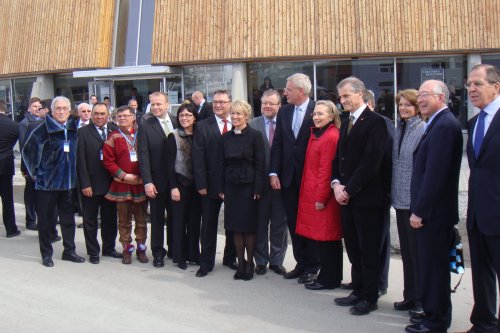
Here is a fact sheet released by the State Department about the Arctic Council meeting results.
Secretary Clinton Signs the Arctic Search and Rescue Agreement with Other Arctic Nations
Fact Sheet
Washington, DC
May 12, 2011
On
May 12, 2011, Secretary of State Hillary Rodham Clinton joined
representatives of the other seven Member States of the Arctic Council (Canada, Denmark, Finland, Iceland, Norway, the Russian Federation, and Sweden)
in signing an Agreement on Cooperation on Aeronautical and Maritime
Search and Rescue (SAR) in the Arctic (Agreement). The Agreement is the
first legally-binding instrument negotiated under the auspices of the
Arctic Council. It coordinates life-saving international maritime and
aeronautical SAR coverage and response among the Arctic States across an
area of about 13 million square miles in the Arctic.
As Arctic
sea ice coverage decreases, ship-borne activities are increasing
significantly in the Arctic. Flight traffic is also on the rise as new
polar aviation routes cross the Arctic air space in several directions.
As human presence and activities in the Arctic expand, the potential for
accidents increases as well. Limited rescue resources, challenging
weather conditions, and the remoteness of the area render SAR operations
difficult in the Arctic, making coordination among the Arctic nations
imperative. The SAR Agreement will improve search and rescue response in
the Arctic by committing all Parties to coordinate appropriate
assistance to those in distress and to cooperate with each other in
undertaking SAR operations. For each Party, the Agreement defines an
area of the Arctic in which it will have lead responsibility in
organizing responses to SAR incidents, both large and small. Parties to
the Agreement commit to provide SAR assistance regardless of the
nationality or status of persons who may need it.
Read more >>>>
(
See more like this here>>>>)
It is immediately apparent why there is a need for this council. Russia is a player.
After Hillary left the State Department, she launched a series of speaking engagements. One of these was in Canada.
Speaking
to the Montreal Board of Trade last night, Hillary Clinton warned the
audience of increased Russian activity in the Arctic and hung
responsibility for another Cold War on Vladimir Putin’s doorknob.
As
Secretary of State, Hillary was an active participant in the Arctic
Council and repeatedly echoed the message that we are an Arctic nation.
The concerns she voiced in Canada are as much an issue for the U.S. as
they are for Canada.
Along with the disquiet she expressed
regarding Russia’s activities in the north came further comments about
recent activities in Europe.
Read more >>>>
In light of the above, this is of some concern or should be to all the member nations including ours.
Russian
servicemen of the Northern Fleet's Arctic mechanised infantry brigade
participate in a military drill on riding reindeer and dog sleds near
the settlement of Lovozero outside Murmansk, Russia January 23, 2017.
Picture taken January 23, 2017. Lev Fedoseyev/Ministry of Defence of the
Russian Federation/Handout via REUTERS
By Andrew Osborn | MURMANSK, Russia
The
nuclear icebreaker Lenin, the pride and joy of the Soviet Union's
Arctic great game, lies at perpetual anchor in the frigid water here. A
relic of the Cold War, it is now a museum.
But nearly three
decades after the Lenin was taken out of service to be turned into a
visitor attraction, Russia is again on the march in the Arctic and
building new nuclear icebreakers.
It is part of a push to firm
Moscow's hand in the High North as it vies for dominance with
traditional rivals Canada, the United States, and Norway as well as
newcomer China.
SNIP
Grigory Stratiy, deputy governor of the
Murmansk Region, told Reuters there was strong interest in sea route
from Asian nations however and that new icebreakers would allow for
year-round navigation in the 2020s.
"Whatever the weather, the
Northern Sea Route will be needed. Its use will definitely grow," said
Stratiy, who said Russia was keen to attract foreign investment to the
Arctic.
When asked about his country's military build-up, he smiled.
"There's no reason to be afraid I can reassure you," he said, saying it was driven only by a need to modernize.
"Russia has never had any aggressive aims and won't have them. We are very friendly people."
Read more >>>>
Anyone
thinking that Putin is playing nice friendly reindeer games up there
is, of course, deluded despite the "peaceful and cooperative nature of
the Arctic Region" as stated on the
State Department page.
We should never trust Putin, as Hillary warned, especially when his
military is involved. So this military build up is one thing to watch.
It's
nice to have ice breakers available when you need them, and the
Russians were very helpful the time the whales were trapped under the
ice as portrayed in that Drew Barrymore movie. Those missile
installations, though. No wonder we sent troops to Norway.
The
North Sea Route concept, characterized in the article as a mini Suez
Canal, is an obvious business venture, but of course the real target is
oil. Drilling in the Arctic is an enterprise popular with Republicans.
Lastly,
how the hell did "newcomer China" get into this competition? It has no
land above the Arctic Circle. Or does it? Is it building synthetic
islands up there, too?
The new administration has a dangerously
narrow view of China's adversarial scope. It goes beyond trans-Pacific
trade and artificial islands to expand its continental limit in the
South China Sea and East China Sea. China has invested in significant
"development" enterprises in Africa centered largely on resource
extraction with tandem infrastructure upgrades benefiting their ability
to move products for shipment and not benefiting local residents or
their farms or businesses in any way. I don't think I have ever heard
Donald Trump say the word "Africa." At the very least, China's presence
in the Arctic deserves a question.
As for Russia, and its military push, we always to well to heed the warnings of Hillary Clinton.
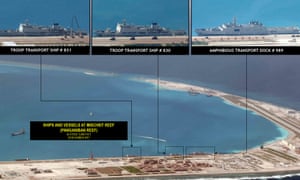

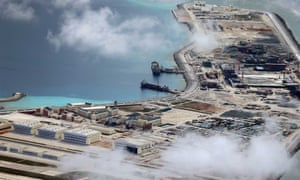
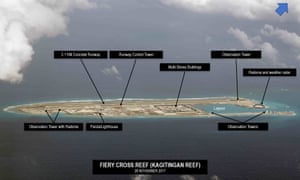


 Hillary Clinton
Hillary Clinton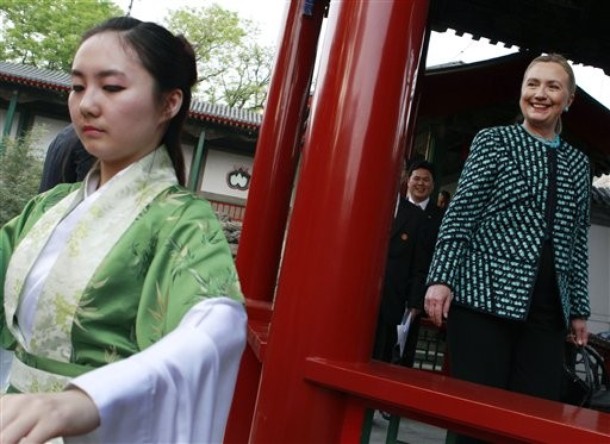
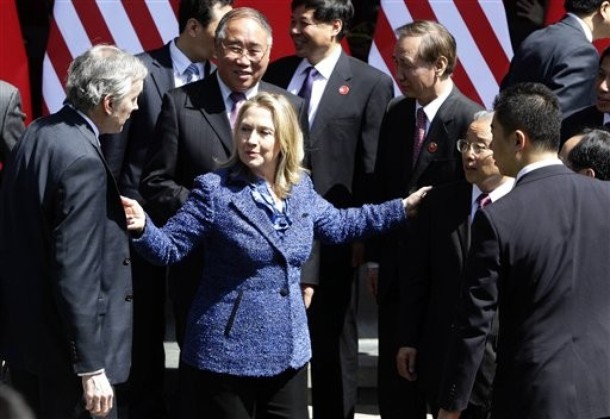
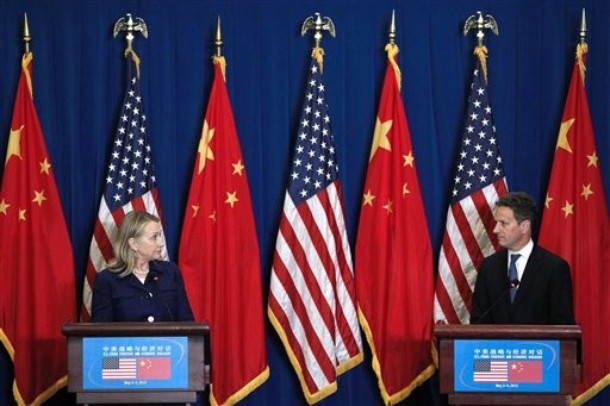
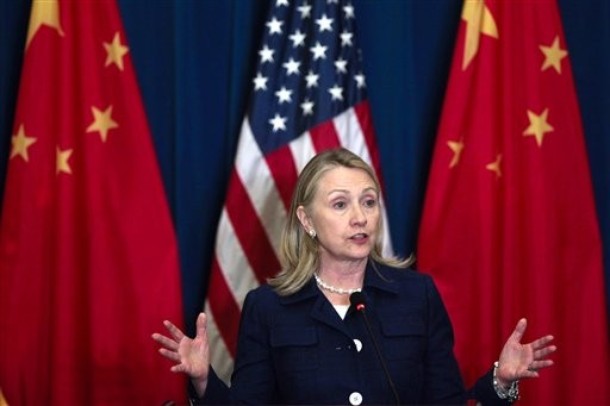
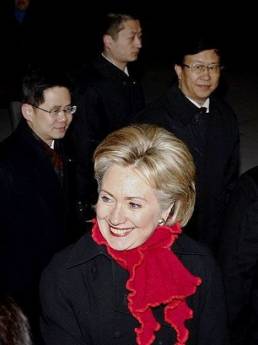
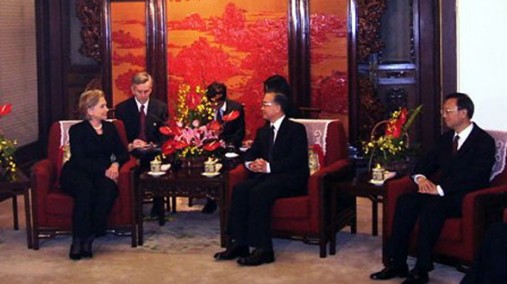



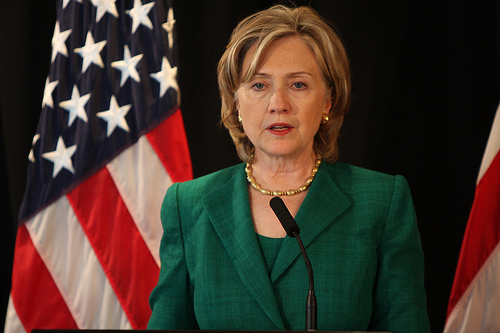
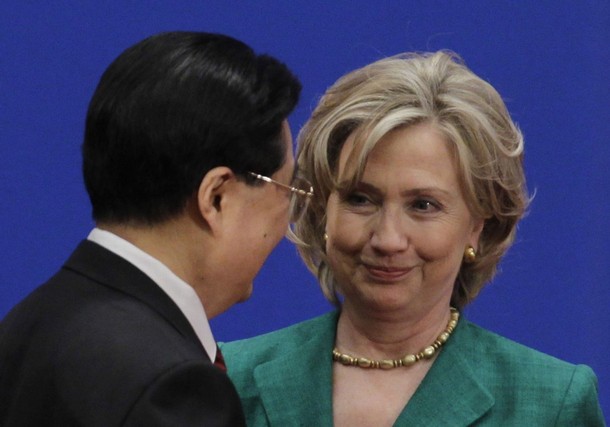










 Hillary Clinton
Hillary Clinton













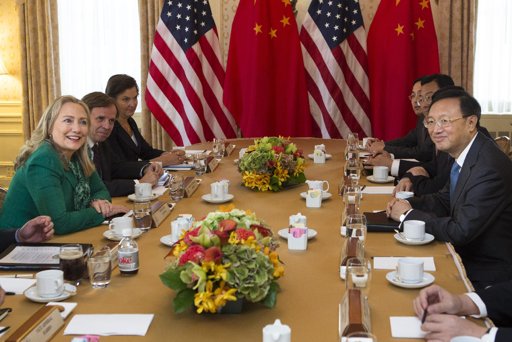


 Hillary Clinton met with Chinese Foreign Minister Yang Jiechi, at the
Ministry of Foreign Affairs in Beijing Tuesday. Jim Watson/AP
Hillary Clinton met with Chinese Foreign Minister Yang Jiechi, at the
Ministry of Foreign Affairs in Beijing Tuesday. Jim Watson/AP